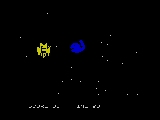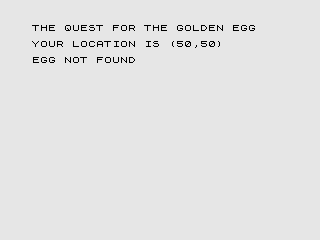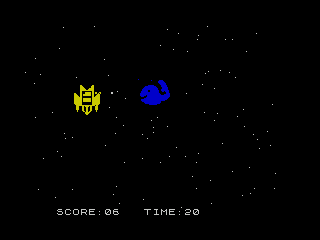
Comp.sys.sinclair Crap Games Competition
Encyclopedia
The comp.sys.sinclair Crap Games Competition (also known simply as the CSSCGC) is an annual competition for crap computer game development. It is specifically targeted at the Sinclair Research range of 8-bit computers including clones, derivatives and emulators of those systems.
and was inspired by the Cascade Cassette 50
compilation as well as Rich Pelley's Crap Game Corner from Your Sinclair
Magazine. It started off in 1996 merely as an idea to "outdo" the original Cassette 50 tape by producing a compilation of newsgroup members' own efforts. During subsequent years, it evolved into the present-day form of competition. As of 2011, the event has taken place every year since 1996 and by the end of 2010 a total of 785 entries had been submitted. To date, the competition has remained an informal hobbyist, community-driven event. Although it lacks any formal organisation or centralised controlling body, it remains an unofficial feature of the retrogaming community amongst which other games are sometimes compared.
tape. Also, games which parody, satirise or even extend those of the original Cassette 50 tape have been submitted. In later years the scope had broadened considerably with many newer titles bearing little resemblance to those on the Cassette 50 tape. Some accepted titles have consisted of technical tricks, joke programs or applications rather than games. Authors have also submitted deliberately good programs to the competition. A significant proportion of submissions have the word "simulator" in the title, a reference to Codemasters
games that often had "simulator" in the title and often alluding to simulating something either completely mundane or conversely something well beyond the realistic limits of an 8-bit system.
Since its inception, the competition had originally been dominated by UK-based entrants and judges, although in 2008 for example, the competition gained considerable international participation, with games being submitted from several countries including most notably Spain, Argentina, Italy & Russia. Of particular note were the submissions of games in the Spanish and Russian languages and an eventual competition victory by a Spanish development team.
Submissions are very often written in interpreted Sinclair BASIC
as BASIC is a natural language for writing crap games. However, submitted titles have also been developed in Z80 machine code, compiled BASIC, Small-C
(using Z88DK
) and FORTH amongst others.
The vast majority of the games submitted are for the ZX Spectrum
platform, which was the most successful and popular Sinclair computer. However, games for the ZX80, ZX81 & Jupiter Ace
(a non-Sinclair "derivative" computer) as well as several other related computer models have also been submitted to the competition. The exact list of permitted hardware platforms as well as the scope of allowed software is at the complete discretion of the incumbent judge, with variations in the rules commonplace from one year to the next.
In theory, the competition is organised, hosted and judged by a different individual each year, although some organisers have hosted and judged it on more than one occasion. The host and judge are often the same person. However, as in the case of the 2005 competition, the judge can be a different person than the host. Typically, the loser of the competition is asked to be the host and/or judge of the following year's competition, whilst the winner may receive a low-value prize, or perhaps nothing at all apart from the recognition of having won. Another informal tradition is that the closing date of the competition may be deliberately set further back by the host whilst the competition itself is running, often adding to the confusion and disorganisation that has been a hallmark of the event. However, as the rules vary according to the judge of the day, these practices are not always upheld. Over the years, the competition has generally maintained a whimsical and humorous approach to retro game development and judging.
FTP site and are ordinarily considered freely distributable, assuming that permission has been granted. Entries up to and including CSSCGC 2008 are also organised and catalogued at Unsatisfactory Software's 'Crap Game Finder' website. However, technically the copyright status of submissions can vary. For example the 2006 competition rules stated that all games are copyright their respective authors whereas the 2008 and 2009 rules simply stated that all authors agree to free distribution of their submissions. In at least one case, an author has withdrawn a submission and rescinded distribution permission on it.
.
History
The competition was originated by posters to the comp.sys.sinclair newsgroupNewsgroup
A usenet newsgroup is a repository usually within the Usenet system, for messages posted from many users in different locations. The term may be confusing to some, because it is usually a discussion group. Newsgroups are technically distinct from, but functionally similar to, discussion forums on...
and was inspired by the Cascade Cassette 50
Cassette 50
Cassette 50 was a compilation of games published by Cascade Games Ltd. The compilation included a Timex digital calculator watch....
compilation as well as Rich Pelley's Crap Game Corner from Your Sinclair
Your Sinclair
Your Sinclair or YS as it was commonly abbreviated, was a British computer magazine for the Sinclair range of computers, mainly the ZX Spectrum.-History:...
Magazine. It started off in 1996 merely as an idea to "outdo" the original Cassette 50 tape by producing a compilation of newsgroup members' own efforts. During subsequent years, it evolved into the present-day form of competition. As of 2011, the event has taken place every year since 1996 and by the end of 2010 a total of 785 entries had been submitted. To date, the competition has remained an informal hobbyist, community-driven event. Although it lacks any formal organisation or centralised controlling body, it remains an unofficial feature of the retrogaming community amongst which other games are sometimes compared.
Details
Generally, the aim of the competition and criteria for entry and ranking have been loosely defined. The focus has tended to be on low-quality games which reproduce the look, feel and un-playability of those found on the original Cascade Cassette 50Cassette 50
Cassette 50 was a compilation of games published by Cascade Games Ltd. The compilation included a Timex digital calculator watch....
tape. Also, games which parody, satirise or even extend those of the original Cassette 50 tape have been submitted. In later years the scope had broadened considerably with many newer titles bearing little resemblance to those on the Cassette 50 tape. Some accepted titles have consisted of technical tricks, joke programs or applications rather than games. Authors have also submitted deliberately good programs to the competition. A significant proportion of submissions have the word "simulator" in the title, a reference to Codemasters
Codemasters
The Codemasters Software Company Limited, or Codemasters is a British video game developer founded by Richard and David Darling in 1986...
games that often had "simulator" in the title and often alluding to simulating something either completely mundane or conversely something well beyond the realistic limits of an 8-bit system.
Since its inception, the competition had originally been dominated by UK-based entrants and judges, although in 2008 for example, the competition gained considerable international participation, with games being submitted from several countries including most notably Spain, Argentina, Italy & Russia. Of particular note were the submissions of games in the Spanish and Russian languages and an eventual competition victory by a Spanish development team.
Submissions are very often written in interpreted Sinclair BASIC
Sinclair BASIC
Sinclair BASIC is a dialect of the BASIC programming language used in the 8-bit home computers from Sinclair Research and Timex Sinclair...
as BASIC is a natural language for writing crap games. However, submitted titles have also been developed in Z80 machine code, compiled BASIC, Small-C
Small-C
In computing, Small-C is both a subset of the C programming language, suitable for resource-limited microcomputers and embedded systems, and an implementation of that subset...
(using Z88DK
Z88DK
Z88DK is a Small-C-derived cross compiler for a long list of Z80 based computers. The name derives from the fact that it was originally developed to target the Cambridge Z88...
) and FORTH amongst others.
The vast majority of the games submitted are for the ZX Spectrum
ZX Spectrum
The ZX Spectrum is an 8-bit personal home computer released in the United Kingdom in 1982 by Sinclair Research Ltd...
platform, which was the most successful and popular Sinclair computer. However, games for the ZX80, ZX81 & Jupiter Ace
Jupiter ACE
The Jupiter Ace was a British home computer of the early 1980s, produced by a company, set up for the purpose, named Jupiter Cantab. The Ace differed from other microcomputers of the time in that it used FORTH instead of the more common BASIC.- Introduction :...
(a non-Sinclair "derivative" computer) as well as several other related computer models have also been submitted to the competition. The exact list of permitted hardware platforms as well as the scope of allowed software is at the complete discretion of the incumbent judge, with variations in the rules commonplace from one year to the next.
In theory, the competition is organised, hosted and judged by a different individual each year, although some organisers have hosted and judged it on more than one occasion. The host and judge are often the same person. However, as in the case of the 2005 competition, the judge can be a different person than the host. Typically, the loser of the competition is asked to be the host and/or judge of the following year's competition, whilst the winner may receive a low-value prize, or perhaps nothing at all apart from the recognition of having won. Another informal tradition is that the closing date of the competition may be deliberately set further back by the host whilst the competition itself is running, often adding to the confusion and disorganisation that has been a hallmark of the event. However, as the rules vary according to the judge of the day, these practices are not always upheld. Over the years, the competition has generally maintained a whimsical and humorous approach to retro game development and judging.
Availability of submissions
As of 2011, all previous competition entries are archived at the World of SpectrumWorld of Spectrum
World of Spectrum is a website devoted to cataloging and archiving material for the ZX Spectrum home computer popular in the 1980s, and has been officially endorsed by Amstrad which holds the rights to the ZX Spectrum brand...
FTP site and are ordinarily considered freely distributable, assuming that permission has been granted. Entries up to and including CSSCGC 2008 are also organised and catalogued at Unsatisfactory Software's 'Crap Game Finder' website. However, technically the copyright status of submissions can vary. For example the 2006 competition rules stated that all games are copyright their respective authors whereas the 2008 and 2009 rules simply stated that all authors agree to free distribution of their submissions. In at least one case, an author has withdrawn a submission and rescinded distribution permission on it.
Table of competitions
The following table is necessarily incomplete since full ranking of all submissions has only been carried out in the later competitions. Also, in 1997 no ranking was applied at all, as the emphasis was in producing a crap game compilation, rather than a competitive event. Some of the earlier websites' original links are now dead and therefore omitted from the table. Others are now only present in archival form, for example on World of Spectrum or the Wayback MachineWayback Machine
The Wayback Machine is a digital time capsule created by the Internet Archive non-profit organization, based in San Francisco, California. It is maintained with content from Alexa Internet. The service enables users to see archived versions of web pages across time, which the Archive calls a "three...
.
| Year | Judge/Organiser | Website | Number of entries | Winning Title | Winning Author | Losing Title | Losing Author |
|---|---|---|---|---|---|---|---|
| 1996 | Blood | (The 1997 page immediately below covers both the 1996 and 1997 archives) | 60 | Anthea Turner's National Lottery Simulator | Alan Moore | - | - |
| 1997 | Blood | http://replay.web.archive.org/20040909211941/http://uk.geocities.com/leetonks/Speccy/crap.html | 51 | - | - | - | - |
| 1998 | Barry Salter | http://replay.web.archive.org/19991008144647/http://www.salterg.demon.co.uk/ (only top-level link to competition page exists - the csscgc page itself was not archived) |
54 | ZX Spectrum Emulator | Derek Jolly | - | - |
| 1999 | Alistair Nelson & Graham Goring | http://replay.web.archive.org/20020606152104/http://www.zx.ru/www.nelsona.freeserve.co.uk/netscape/csscgc/ | 41 | Sheepdog | Ian Collier | - | - |
| 2000 | Graham Goring | http://replay.web.archive.org/20080611154314/http://www.duketastrophy.demon.co.uk/csscgc2k/ | 53 | Erotic Pinball | Chris Young | - | - |
| 2001 | Adam D. Moss | http://icculus.org/~aspirin/csscgc2001/ | 37 | Fire Electric Pen | Joe Mackay | - | - |
| 2002 | Paul Equinox Collins | http://equ.in/ox/spectrum/csscgc/2002/ | 21 | Millionaire | Chris Young | - | - |
| 2003 | Dave the Lurker | http://replay.web.archive.org/20080704190826/http://8bitorbust.info/cgc/ | 75 | Crap Invaders | Woody | - | - |
| 2004 | Jim Langmead | http://www.worldofspectrum.org/speccyspoilers/cgc2004/index.html | 69 | Falling | Paul Equinox Collins | - | - |
| 2005 | Starglider/deKay | http://lofi-gaming.org.uk/speccy/csscgc/csscgc-2005/ | 45 | George Best Deathbed Simulator, The | Alex Taylor | - | - |
| 2006 | Matt Rudge | http://www.mattrudge.net/cgc2006/ | 37 | Celebrity Arses | Crapman | Advanced Big Brother Head of Security Simulator | Chris Young |
| 2007 | Chris Young & Phillip Lake | http://www.unsatisfactorysoftware.co.uk/index.php?pg=cgc2007 | 41 | Dobsonic Defendor (Gold Edition) | David Mackenzie | The Quest for the Golden Egg | Digital Prawn |
| 2008 | Digital Prawn | http://reptonix.awardspace.co.uk/sinclair/csscgc2008/ | 123 | The Ultimate First Communion Simulator | The Mojon Twins | Lapland Theme Park Manager | Cruddy Software |
| 2009 | Guesser | http://alistairsserver.no-ip.org/public/cgc/ | 37 | Whack-A-Nun | Ben Rapier | Knot in 2D (Machine Code Edition) | BloodBaz |
| 2010 | BloodBaz | http://csscgc2010.zxlife.net | 42 | Complete Useless Machine Simulator | Dr. Beep | Homeless Horace | Mulder |
| 2011 | The Mojon Twins | http://www.mojontwins.com/csscgc2011/ | - | (TBA) | (TBA) | (TBA) | (TBA) |
Example submission screenshots
 |
 |
External links
- [ftp://ftp.worldofspectrum.org/pub/sinclair/csscgc/ Archived zip files of past competition submissions]
- CSSCGC Crap Game Finder
- Complete guide to writing a crap game

